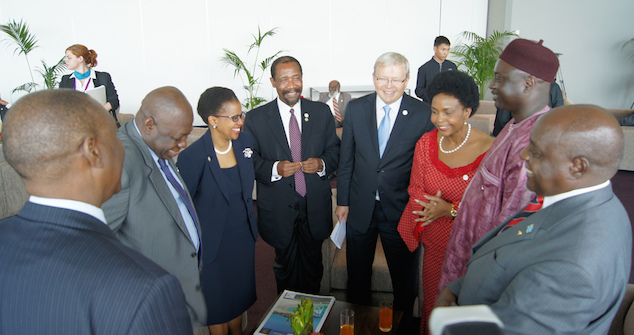Between Jakarta and Geneva: Why Abbott Needs to View Africa as a Great Opportunity

Dr Samuel Makinda explains why engaging with Africa is in Australia’s national interest.
Australia’s engagement with African countries during the Rudd and Gillard Governments from 2008 to 2013 was primarily driven by Australia’s national interest, but it also met some of the core goals of African states. On the Australian side, the national interest revolved around three themes: humanitarianism, support for mining corporations, and multilateral diplomacy in the form of the two-year United Nations Security Council seat. But, on the African side, the core goals included alleviating poverty, food security, and the reduction in maternal and infant mortality rates. The basis for Australia’s engagement with Africa has not changed, and this is why there is a need for the Abbott Government to retain the same depth and breadth of relationships with African countries.
If the Australian national interest in Africa has not shifted since the Abbott Government came to office, what is the national interest? The meaning of the national interest is not fixed, but it is often associated with the desire for power as well as with the pursuit of political, economic and security objectives that deliver the country advantages in particular circumstances. However, these advantages need not be acquired at the expense of other international actors. Depending on the issues in question and the prevailing conditions, it is possible for the national interests of various actors to benefit from the same deal. In Australia, the Department of Foreign Affairs and Trade has defined the national interest as the security and prosperity of Australia and Australians. It has further claimed that the national interest could be understood broadly to include humanitarian assistance as well as the promotion of good governance, human rights and development. Indeed, the Australian government has previously argued that the improvement of governance around the world has the potential to create an environment that contributes to the security and prosperity of Australians. Thus, good governance in an African state would not only improve the conditions of that country, but it would also help advance Australia’s national interest.
As part of its humanitarian mission, Australia has assisted some African states to meet their Millennium Development Goals and to tackle other problems in sectors in which Australia has expertise, experience, and comparative advantage. These sectors include agriculture and food security, water and sanitation, maternal and child health, and various areas of public policy. As a result, the Rudd and Gillard Governments increased Australian scholarships to Africa from 100 in 2007 to 1000 in 2012 – 2013. The scholarship program facilitated the export of Australia’s education to Africa, which is in the national interest, but it also helped impart skills to Africans who would help improve socio-economic conditions in their countries.
Through its broad and deep engagement, Australia earned the respect of many African states, which, in turn, supported Australia’s bid for a two-year UN Security Council seat. Australia won the seat in October 2012 and served on the Security Council between 2013 and 2014. While some critics viewed Australia’s engagement in Africa under the ALP leadership as a cynical move that would largely benefit Canberra, Africa’s stability can easily be linked to the debates within, and activities of, the UN Security Council. Australia’s attainment of a UN Security Council seat with African support underlines the significance of a strong engagement with Africa if Australia intends to maintain a high profile and achieve other goals through multilateral diplomacy. Therefore, continued engagement with Africa will serve Australia well, not just for the UN Security Council business, but also in other international forums.
Australia’s engagement with Africa has also partly stemmed from the fact that about 200 Australia-based mining and exploration companies have approximately 650 mining projects in 42 African countries. The exploitation of mineral resources is capital-intensive and only large companies with access to large funds can undertake this practice. In order to help African states negotiate successfully with such companies, Australia has offered to train African policy makers in mining governance, which benefits both Australia and African states.
Finally, Australia’s continued engagement with Africa will deliver significant trade and economic benefits in the long-term because Africa is one of the fastest growing regions of the world. While a large percentage of the world’s least-developed countries are in Africa, so are six of the ten fastest-growing economies in the world. The rapid transformation of Africa has been due to several factors, including the improvement in the quality of governance, growing political stability, the increasing use of information and communications technology, and rapid urbanization. Moreover, African economies, taken together, grew at an average annual rate of over six percent in the past decade.
Given the above factors, it is imperative that the Abbott Government maintains a strong engagement with Africa.
Dr Samuel Makinda is Professor of International Relations and Security Studies, Murdoch University.
This piece is a shortened form of his article in the Australian Journal of International Affairs.





